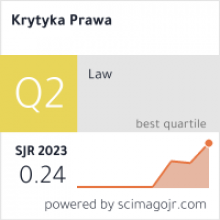This article has originated from observations of the current Polish political and legal disputes over the Constitution. In pursuing the reasons for the different lines of the argumentation presented, we have brought the issue of education in constitutional law to attention. We have covered the issue in two stages. The first stage involves a discussion of education models as expounded in social theory. Our starting point was the structural-functional model and its criticism along the lines of conflict, interpretative, and critical theories. This is followed by a presentation of the evolution of administrative-law institutions in the light of the conflict between the expected openness to ethical and political dimensions and the claims for integrity and coherence. To this end, we followed the proposals of Nonet and Selznick. The second stage includes a review of three conceptions of the constitution and constitutionalism. The views of Kelsen, Schmitt as well as the American judicial review doctrine served as model examples. These proposals can be presented as the cornerstones of three visions of constitutional-law education. We did not content ourselves with presenting a set of models of education and covering a reconstruction of the vision of constitutional education. We have also attempted to demonstrate, bearing in mind the nature of the Polish debate over the Constitution, that the judicial review doctrine opens up a promising sphere for a revaluation of both the theory and practice of constitutional law.







